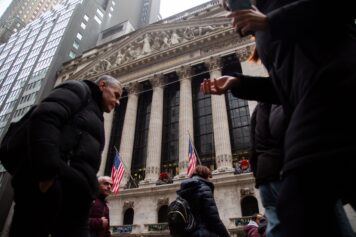By Charlie Wells
Tensions in Ukraine have markets on edge. Stocks are swinging, oil is closing in on $100 a barrel and uncertainty looms over investors big and small.
But it’s more of a short-term headache than a long-term drag. That’s the view of analysts on both sides of the Atlantic trying to discern what the geopolitical crisis means for investor portfolios in the wake of Russia recognizing two self-proclaimed republics in eastern Ukraine.

Tom Essaye, a former Merrill Lynch trader who founded “The Sevens Report” newsletter, sees the conflict dominating near-term headlines. But he doesn’t expect it to dictate market moves in the long or even medium term. Instead, the most important factors “remain Fed tightening and economic growth,” he wrote.
JPMorgan strategists led by Dubravko Lakos-Bujas were of a similar mind in their recent note to clients, citing the larger risk of tightening monetary policy for equities and noting that Russia-Ukraine tensions are a low earnings risk for U.S. corporates.
“But an energy price shock amidst an aggressive central bank pivot focused on inflation could further dampen investor sentiment and growth outlook,” they wrote.
In the U.K., Bloomberg Intelligence equities strategist Tim Craighead wrote that European stocks face limited risk, “unless Russian energy supplies are cut.” The crisis might “shuffle the leader board temporarily” in terms of European equities, but Craighead noted that the market seems to be more focused on rising inflation, elevated margins and central bank tightening.
Still, Steve Clayton, who manages HL Select Funds at Hargreaves Lansdown in the U.K., noted that the crisis won’t be over in a blip.
“Russian troops have not massed along the Ukrainian border in order to hold a cake sale,” he wrote in a note on Tuesday. “However this unfolds, tensions and uncertainties are likely to run hot for some time to come. The market will not like any escalation, nor will it trust any settlement between the parties unless accompanied by a rapid demobilization of Russian forces around Ukraine.”
Clayton sees U.S. Treasuries and Japanese government bonds as potential beneficiaries as investors seek safe havens. Given the nature of the conflict, he also points to defense stocks such as Bae Systems Plc as possible destinations, given that “European politicians are unlikely to urge for lower defense spending while the Russian bear is growling angrily.”
Banking stocks — which have been outperforming in Europe so far this year — could be losers. The U.K. just announced sanctions on five Russian banks. The EU proposed a package of sanctions on banks that finance Russian operations in the region.
“Effective sanctions will impact on economic activity and banks will be where it is felt in the West,” Clayton wrote. “Lending volumes would be hit too, if tensions really rocket, because cautious consumers and businesses will refrain from borrowing until they feel more confident.”
Travel and leisure could also lose some steam, as they tend to when international tensions rise, wrote Clayton. Among several stocks, he pointed to Wizz Air, which has a significant network across Central and Eastern Europe.
“Times of tension are when defensiveness can pay off,” he wrote. “People still have to eat, take medicines and get operated upon. Food retailers and drug companies like Sainsbury and AstraZeneca could be interesting, but Tesco’s exposure to Central Europe will not help.”
More stories like this are available on bloomberg.com.




